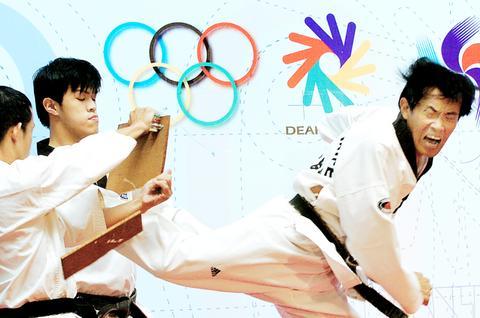The Deaflympic Games, a quadrennial Olympic-equivalent event for athletes with hearing impairments will take place in Taipei from Sept. 5 to Sept. 15 in 2009. Taipei City Government yesterday publicly solicited designs for the official logo and mascot for the games.
"It is a major coup for Taipei City to win the bid for hosting the 2009 Deaflympic Games as Athens, the host of the 2004 Summer Olympics, also competed with us for the bid last February," Taipei Mayor Ma Ying-jeou (
"It is not only an honor, but also a challenge for Taipei to host this international sporting event," Ma said.

PHOTO: SEAN CHAO, TAIPEI TIMES
"The city government will take the opportunity to promote Taiwan, and also to help the international community understand us better," he added.
Finishing the job
Ma said the Deaflympic Games is one of the four Olympic-level games approved by the International Olympic Committee, and the city government will endeavor to finish four large stadiums and five MRT lines before 2009, so that Taipei can meet international standards.
"No matter what my status is in 2009, be it a former Taipei Mayor or simply a Taipei citizen, I will certainly participate in the games," Ma said.
Ma's current term ends in 2006.
The Deaflympic Games, under the auspices of the International Committee of Deaf Sports, were first held in Paris in 1924, making it the oldest among the disabled sports organizations.
The next Deaflympic Games will kick off in Melbourne, Australia in 2005.
From Sept. 5 to Sept. 15, 2009, Taipei will come alive with over 8,000 athletes from about 100 countries around the world who will join in the 21st Deaflympic Games.
"The year 2009 will be a glorious year for Taiwan," said Chi Cheng (
"In Taipei, we will have the Deaflympic Games. In Kaohsiung, we will have the World Games. Taiwanese people should be proud," he said.
Designers have to pitch their proposed designs for the official logo and mascot before Sept. 30 to www.deafsports.org.tw. The winning designer will be awarded NT$50,000.

An essay competition jointly organized by a local writing society and a publisher affiliated with the Chinese Communist Party (CCP) might have contravened the Act Governing Relations Between the People of the Taiwan Area and the Mainland Area (臺灣地區與大陸地區人民關係條例), the Mainland Affairs Council (MAC) said on Thursday. “In this case, the partner organization is clearly an agency under the CCP’s Fujian Provincial Committee,” MAC Deputy Minister and spokesperson Liang Wen-chieh (梁文傑) said at a news briefing in Taipei. “It also involves bringing Taiwanese students to China with all-expenses-paid arrangements to attend award ceremonies and camps,” Liang said. Those two “characteristics” are typically sufficient

A magnitude 5.9 earthquake that struck about 33km off the coast of Hualien City was the "main shock" in a series of quakes in the area, with aftershocks expected over the next three days, the Central Weather Administration (CWA) said yesterday. Prior to the magnitude 5.9 quake shaking most of Taiwan at 6:53pm yesterday, six other earthquakes stronger than a magnitude of 4, starting with a magnitude 5.5 quake at 6:09pm, occurred in the area. CWA Seismological Center Director Wu Chien-fu (吳健富) confirmed that the quakes were all part of the same series and that the magnitude 5.5 temblor was

The Central Weather Administration has issued a heat alert for southeastern Taiwan, warning of temperatures as high as 36°C today, while alerting some coastal areas of strong winds later in the day. Kaohsiung’s Neimen District (內門) and Pingtung County’s Neipu Township (內埔) are under an orange heat alert, which warns of temperatures as high as 36°C for three consecutive days, the CWA said, citing southwest winds. The heat would also extend to Tainan’s Nansi (楠西) and Yujing (玉井) districts, as well as Pingtung’s Gaoshu (高樹), Yanpu (鹽埔) and Majia (瑪家) townships, it said, forecasting highs of up to 36°C in those areas

The brilliant blue waters, thick foliage and bucolic atmosphere on this seemingly idyllic archipelago deep in the Pacific Ocean belie the key role it now plays in a titanic geopolitical struggle. Palau is again on the front line as China, and the US and its allies prepare their forces in an intensifying contest for control over the Asia-Pacific region. The democratic nation of just 17,000 people hosts US-controlled airstrips and soon-to-be-completed radar installations that the US military describes as “critical” to monitoring vast swathes of water and airspace. It is also a key piece of the second island chain, a string of